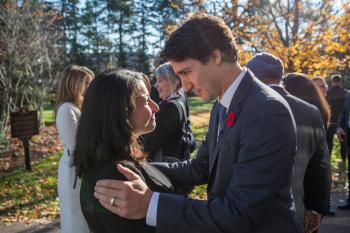As the Parliamentary Special Committee on Electoral Reform (ERRE) meets behind closed doors struggling against time to have their report ready by their target date (December 1), my concerns about the evolution of Canadian democracy increase.
From the beginning the process was interesting. The ERRE composition was amended after pressure was put on the prime minister to give up the Liberal majority on the committee and be more inclusive. Representation of all parties and percentage of seats given to each party on the committee, which is closer to the percentage of popular vote they got in the 2015 election than to the percentage of seats they hold in parliament, were both steps in the right direction. I saw the latter as an acknowledgement that representing the popular support is the way to go when taking important decisions.
As the ERRE public hearings proceeded throughout the months there was overwhelming support for one form or another of proportional representation as a fair voting system. This was reassuring to some of us, yet was obviously alarming to others.
The Liberals started backing away from the commitments made during the election campaign. Both Prime Minister Trudeau and Democratic Institutions Minister Maryam Monsef seem to be trying hard to find arguments that would absolve them from the promise to make "every vote count."
Trudeau had made two clear promises on the campaign trail. One was that the 2015 elections would be the last under the first-past-the-post system (FPTP); and the second, and more important one, is that the new system will make "every vote count." The two promises are not one and the same since some alternatives to FPTP may make votes "count" even less.
There is little idealism in the way political parties make decisions, especially when it comes to decisions that may harm their chances of clinging to power. Most parties, especially ones that have a history in ruling, look for strategies to stay in or return to power. The Liberal party is no exception. The leadership and the party brass will be inclined to support an electoral system that increases their chances in staying in power rather than one that would reduce such chances.
Being the centrist party, which would probably be the second choice for many voters in any given riding, it is understandable -- though not acceptable -- that they push towards such a system as ranked ballots despite the fact that it does not make every vote count and does not result in a Parliament that reflects the first choice of the electors.
As the ERRE consultation process increasingly supported some form of proportional representation, the Liberals, Trudeau and Monsef started to be more manipulative and less clear in their statements. They seemed to be trying to find ways to invalidate or cast doubt on what the ERRE is being told and may end up recommending by initiating a web-based survey to which all Canadians will be invited.
Although I have no objection in principle with such a survey if the questions are clear, my reading of the current scene makes me doubt that this would be the case. It seems to be a ploy to create confusion and an attempt to reduce the effect of any recommendations the ERRE may come up with.
The Liberals are also opposing a referendum. Why? Monsef says referendums are divisive. I find this a disappointing statement from someone whose mandate is to encourage democracy. She should understand that referendums have their place in the democratic process and can't be simply brushed away with such a blanket statement.
Others outside the Liberal party seem to be against a referendum as well, but this time because they fear the result. Not me. Especially not after the P.E.I. referendum which assured me that a clear question and a fair campaign where all sides get equal opportunities to present their case would lead to a fair answer.
Trudeau's credibility hangs in the balance. He promised the next election will be held under a system other than FPTP, one that makes every vote count.
Chip in to keep stories like these coming.
Image: Facebook/Maryam Monsef




Comments
Do
Don't